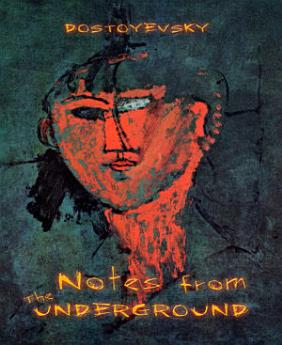Notes from the Underground
জুন ২০১৯ · BookRix
৪.৭star
৭টি রিভিউreport
ই-বুক
177
পৃষ্ঠা
family_home
উপযুক্ত
info
reportরেটিং ও রিভিউ যাচাই করা হয়নি আরও জানুন
এই ই-বুকের বিষয়ে
Notes from the Underground is a novella by Fyodor Dostoyevsky. Notes is considered by many to be the first existentialist novel. It presents itself as an excerpt from the rambling memoirs of a bitter, isolated, unnamed narrator (generally referred to by critics as the Underground Man) who is a retired civil servant living in St. Petersburg. The first part of the story is told in monologue form, or the underground man's diary, and attacks emerging Western philosophy, especially Nikolay Chernyshevsky's What Is to Be Done?. The second part of the book is called "Àpropos of the Wet Snow", and describes certain events that, it seems, are destroying and sometimes renewing the underground man, who acts as a first person, unreliable narrator.
Dostoyevsky again confronts the concept of free will and constructs a negative argument to validate free will against determinism in the character Kirillov's suicide in his novel The Demons. Notes from Underground marks the starting point of Dostoyevsky's move from psychological and sociological themed novels to novels based on existential and general human experience in crisis. War is described as people's rebellion against the assumption that everything needs to happen for a purpose, because humans do things without purpose, and this is what determines human history. The philosopher Friedrich Nietzsche called Dostoevsky "the only psychologist, incidentally, from whom I had anything to learn."
Dostoyevsky again confronts the concept of free will and constructs a negative argument to validate free will against determinism in the character Kirillov's suicide in his novel The Demons. Notes from Underground marks the starting point of Dostoyevsky's move from psychological and sociological themed novels to novels based on existential and general human experience in crisis. War is described as people's rebellion against the assumption that everything needs to happen for a purpose, because humans do things without purpose, and this is what determines human history. The philosopher Friedrich Nietzsche called Dostoevsky "the only psychologist, incidentally, from whom I had anything to learn."
রেটিং ও পর্যালোচনাগুলি
৪.৭
৭টি রিভিউ
ই-বুকে রেটিং দিন
আপনার মতামত জানান।
পঠন তথ্য
স্মার্টফোন এবং ট্যাবলেট
Android এবং iPad/iPhone এর জন্য Google Play বই অ্যাপ ইনস্টল করুন। এটি আপনার অ্যাকাউন্টের সাথে অটোমেটিক সিঙ্ক হয় ও আপনি অনলাইন বা অফলাইন যাই থাকুন না কেন আপনাকে পড়তে দেয়।
ল্যাপটপ ও কম্পিউটার
Google Play থেকে কেনা অডিওবুক আপনি কম্পিউটারের ওয়েব ব্রাউজারে শুনতে পারেন।
eReader এবং অন্যান্য ডিভাইস
Kobo eReaders-এর মতো e-ink ডিভাইসে পড়তে, আপনাকে একটি ফাইল ডাউনলোড ও আপনার ডিভাইসে ট্রান্সফার করতে হবে। ব্যবহারকারীর উদ্দেশ্যে তৈরি সহায়তা কেন্দ্রতে দেওয়া নির্দেশাবলী অনুসরণ করে যেসব eReader-এ ফাইল পড়া যাবে সেখানে ট্রান্সফার করুন।








